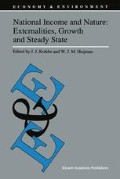Abstract
In this chapter I attempt to analyse the methodological foundations of environmental economics. Attention is paid to two important schools of thought: the neo-dassical and the steady state analysis. The first school, which is the mainstream school of thought in contemporary (non-environmental) economic analysis, concentrates on the subjective welfare or utility theoretical approach, while the second pays particular attention to physical laws. The latter is also known as ecological economics. This essay attempts to gain a dearer insight into the methodological backgrounds or meta-economic structures of both schools. The term meta-economics which was used by Schumacher (1973) is defined here as the underlying assumptions of economic analysis. Underwood and King (1989) spoke of the ‘set of first principles shaping theoretical development’. In particular, Gunnar Myrdal (1954) and Joan Robinson (1962) re-established the importance of these (metaphysical) first principles for the development and evolution of economic thought. They both argued that all analyses ultimately rest on ideologically conditioned subjective beliefs. Economists may approach the subject differently and come to different conclusions, depending on how they think about meta-economic and ideological principles.
R. A. Jongeneel is Lecturer in the Department of General Economics of Wageningen Agricultural University. The author would like to thank Professor E. Schuurman, Department of Philosophy, Delft Technical University and Wageningen Agricuitural University, and Emeritus Professor B. Goudzwaard, Department of Economics, Amsterdam Free University, for their valuable comments on an earlier draft of this paper. Tbe usual disclaimer applies.
Access this chapter
Tax calculation will be finalised at checkout
Purchases are for personal use only
Preview
Unable to display preview. Download preview PDF.
References
Achterhuis H., Het rijk van de schaarste; van Tbomas Hobbes tot Michael Foucault. Ambo, Baarn 1988.
Ayres R.U. and A.V. Kneese, Production, consumption and externalities. American Economic Review Vol. 59 (1969) pp.282–97.
Baumol W.J. and W.E. Oates, The theory of environmental policy, (second edition). Cambridge University Press, Cambridge 1988.
Barnett J. and C. Morse, Scarcity and growth: the economics of natural resource availability. Johns Hopkins University Press, Baltimore 1963.
Blaug M., Paradigms versus research programmes in the history of economics. In: D.M. Hausman (ed.).
Boulding K.E., The economics of the coming spaceship Earth. In H. Daly (ed.) (1973).
Daly H.E. (ed.), Economics, ecology, ethics: essays towards a steady state economy. Freeman, San Francisco Calif. 1973.
Daly H.E., Steady state economics. Freeman, San Francisco Calif., 1977.
Dooyeweerd H., A new critique of theoretical thought, 3 vol.. Philadelphia, Presbyterian and Reformed Publ. Co., Philadelphia 1953.
Ehrlich P.R., The limits to substitution: meta-resource depletion and a new economic-ecological paradigm. Ecological Economics Vol. 1 (1989) pp.9–16.
Fisher A.C. and F.M. Peterson, The environment in economics: a survey. Journal of Economic Literature Vol. XVI (1976) pp.1–33.
Georgescu-Roegen N., The entropy law and the economic process. Harvard University Press, Cambridge Mass., 1971.
Hausman D.M. (ed.), The philosophy of economics: an anthology. Cambridge University Press, Cambridge, 1984.
Heilbroner R.L., The worldly philosophers. Simon & Schuster Inc., New York, 1953
Hicks J., Causality in economics. Basic Books, New York, 1979.
Hotelling H., The economics of exhaustible resources. Journal of Political Economy Vol. 39 (1931) pp.137–75.
Hueting R., Correcting of national income for environmental losses: a practical solution for a theoretical dilemma. Paper prepared for the Conference on Ecological Economics. Washington, D.C., May 21–23, 1990.
Jevons S.J., The theory of political economy. Penguin, Baltimore, 1970.
Johansson P.-O., The economic theory and measurement of environmental benefits. Cambridge University Press, Cambridge, 1987.
Knight F.H., On the history and method of economics: selected essays. University of Chicago Press, Chicago, Ill., 1956.
Latour B. and S. Woolga, Laboratory life: the construction of scientific facts. Princeton University Press, Princeton, 1986.
van Manenschijn G., Moraal en eigenbelang bij Tbomas Hobbes en Adam Smith. Rodopi, Amsterdam, 1979.
Menger C., Principles of economics. Free Press, New York, 1953.
Myrdal G., The political element in the development of economic theory. Harvard University Press, Cambridge, Mass., 1954.
Nijkamp P., Naar een prijzenswaardig milieu?! Van Gorcum, Assen, 1979.
Norgaard R.B., The case for methodological pluralism. Ecological Economics Vol. 1 (1989) pp.37–57.
Pigou A.C., The economics of welfare. MacMillan, London, 1932.
Robbins L., An essay on the nature and significance of economic science. Macmillan, London, 1932.
Robinson J., Economic philosophy. Aldine, Chicago Ill., 1962.
Schumacher E.F., Small is beautiful: a study of economics as if people mattered. Blond Briggs, London, 1973.
Solow R.M., The economics of resources and the resources of economics. American Economic Review Vol. 64 (1974) pp.1–14.
Underwood D.A. and P.G. King, On the ideological foundations of environmental economics. Ecological Economics Vol. 1 (1989) pp.315–34.
Walras L., Elements of pure economics (translation). Irwin, Homewood Ill., 1954.
Withagen C., Topics in resource economics. In: F. van der Ploeg (ed.), Advanced Lcctures in Quantitative Economics, Academic Press, London, 1990.
Editor information
Editors and Affiliations
Rights and permissions
Copyright information
© 1992 Springer Science+Business Media Dordrecht
About this chapter
Cite this chapter
Jongeneel, R. (1992). The Neo-Classical and Steady State Approaches to Environmental Economics: a few methodological remarks. In: Krabbe, J.J., Heijman, W.J.M. (eds) National Income and Nature: Externalities, Growth and Steady State. Economy & Environment, vol 5. Springer, Dordrecht. https://doi.org/10.1007/978-94-011-2590-1_11
Download citation
DOI: https://doi.org/10.1007/978-94-011-2590-1_11
Publisher Name: Springer, Dordrecht
Print ISBN: 978-94-010-5143-9
Online ISBN: 978-94-011-2590-1
eBook Packages: Springer Book Archive

